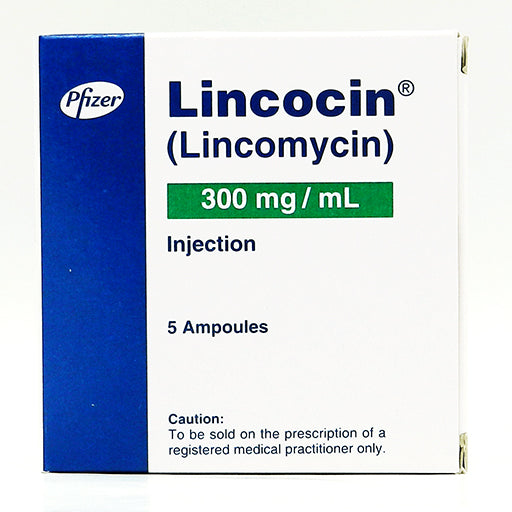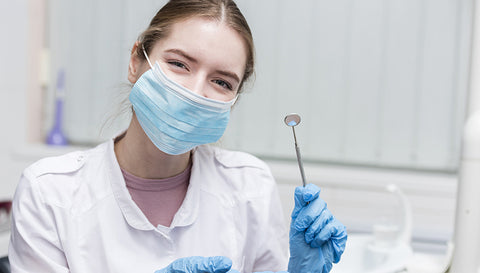Your cart is currently empty.
Lincocin (300mg/ml) Injection – 5 Ampoules | Antibiotic for Severe Bacterial Infections
: Available:
QUESTIONS & ANSWERS
Have a Question?
Be the first to ask a question about this.
Category:

Description
Lincocin Injection contains Lincomycin, a broad-spectrum antibiotic used to treat severe bacterial infections when other antibiotics are ineffective or unsuitable. It works by inhibiting bacterial protein synthesis, thereby stopping the growth of infection-causing bacteria.
This medicine is particularly prescribed for respiratory tract infections, bone and joint infections, skin infections, septicemia, and post-surgical infections caused by susceptible bacteria.
Ingredients (Per ml)
-
Lincomycin Hydrochloride 300mg (active ingredient)
-
Excipients (for injection solution)
Drug Class
-
Lincosamide Antibiotic
Dosage Form
-
Injection (Ampoule – 300mg/ml, Pack of 5)
Uses
Lincocin Injection is prescribed for:
-
Severe respiratory infections (pneumonia, bronchitis, lung abscess)
-
Bone and joint infections (osteomyelitis, septic arthritis)
-
Skin and soft tissue infections (abscess, cellulitis, infected wounds)
-
Septicemia (blood infections)
-
Post-surgical infections
-
Infections where penicillin or other antibiotics cannot be used
Dosage
-
Adults: 600 mg IM every 12–24 hours, or as prescribed
-
IV use: Slow infusion under medical supervision
-
Children: Dose adjusted according to body weight and infection severity
-
Always follow the exact dose prescribed by your physician
In Case of Overdose
-
Symptoms: Severe diarrhea, abdominal cramps, dizziness, or allergic reaction
-
Seek emergency medical help immediately
Missed Dose
-
Take the missed dose as soon as remembered
-
If it’s close to the next scheduled dose, skip the missed one
-
Do not double the dose
How To Use
-
For intramuscular (IM) or intravenous (IV) administration only
-
Must be administered by a healthcare professional
-
Do not self-inject
When Not to Use
Avoid Lincocin Injection if you have:
-
Allergy to lincomycin or clindamycin
-
History of severe colitis or antibiotic-associated diarrhea
-
Severe liver or kidney impairment (unless closely monitored)
-
Infants under 1 month (contraindicated)
Side Effects
Common:
-
Pain or irritation at injection site
-
Nausea, vomiting, or diarrhea
-
Stomach cramps
-
Headache or dizziness
Serious (rare):
-
Severe diarrhea (pseudomembranous colitis)
-
Allergic reactions (rash, swelling, difficulty breathing)
-
Liver function abnormalities
Precautions & Warnings
-
Use with caution in liver or kidney disease
-
Not recommended during pregnancy or breastfeeding unless prescribed
-
Prolonged use may lead to secondary infections (superinfection)
-
Report persistent diarrhea immediately (risk of severe colitis)
-
Complete the full course even if you feel better
Drug Interactions
-
May interact with muscle relaxants (e.g., succinylcholine)
-
Increases risk of side effects with erythromycin (avoid combination)
-
Inform doctor about all ongoing medications, especially antibiotics
Storage/Disposal
-
Store below 25°C, protected from light
-
Do not freeze
-
Keep out of reach of children
-
Dispose used ampoules as per pharmacist/doctor guidance
Control Drug
-
Not a controlled substance
-
Prescription-only medicine (Rx)
Quick Tips
-
Do not stop treatment early, even if symptoms improve
-
Drink plenty of fluids unless restricted by doctor
-
Inform your doctor if you develop diarrhea, rash, or unusual fatigue
-
Not effective for viral infections (like flu or cold)
Your order of 100$ or more gets free standard delivery.
- Standard delivered 4-5 Business Days
- Express delivered 2-4 Business Days
Orders are processed and delivered Monday-Friday (excluding public holidays)
eMarket members enjoy free returns.
Related Products

Categories
Custom HTML Text
-
Free Delivery
From Rs 5000
-
Support 24/7
Online 24 hours
-
Free return
365 a day
- Choosing a selection results in a full page refresh.
Added to cart successfully. What's next?

Product type: 1
1 x $00.00






















 Chat with Us
Chat with Us